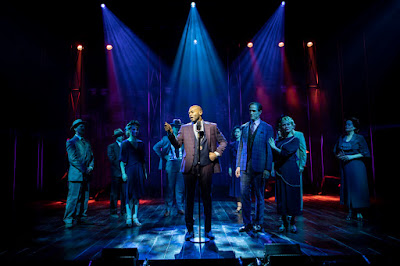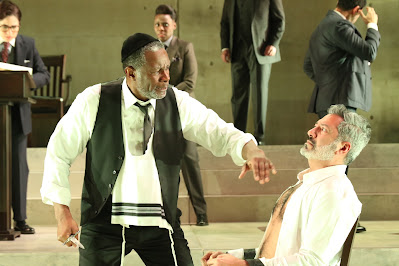Theater Review: Just for Us, Black No More, The Merchant of Venice
Just for Us (c) Monique Carboni
Theater: Just For Us
Soho Playhouse (reopening on March 14)
Alex Edelman is a young comedian who thinks he can make the leap to comedic monologist, a la Mike Birbiglia, Hannah Gadsby and Sandra Bernhard. It’s not an easy leap. Being funny is one thing, but a successful solo play has to skillfully incorporate the jokes to create an arc around a central narrative, while also making the audience think a little. Edelman has a few hiccups along the way, but his newest show, “Just For Us,” is a delightful home run (having Birbiglia as your mentor doesn’t hurt). I didn’t see his earlier shows, “Millennial” or “Everything Handed to You,” but the reason this show will be his calling card from here on out is because he has a gem of a hook: What if a Manhattan Jew attended a white supremacist meeting in Queens? Edelman’s delicious variation on the plot of Spike Lee film “BlacKkKlansman,” however, doesn’t really come into play until the second half. For the first half, he gives us a pretty succinct autobiography of his Orthodox Jewish upbringings in Boston with his Olympic athlete brother (in skeleton sledding of all things) before launching into how he saw a tweet about the meeting and why he decided to go. I’m specifically not divulging too many details because you should experience Edelman’s easygoing storytelling yourself. I wish he trusted his material enough to not have some audience participation moments (although I did guess the singer of a recording and yelled it out the night I went), and the story about that recording could have used more parallels to the main story about being an outsider in a homogenized group. But he and director Adam Brace do a wonderful job creating this world with only a mic stand, three stools and a surprise prop in Edelman’s pants. But I may have said too much already.
Black No More (c) Monique Carboni
Theater: Black No More
At The New Group
There is something so vital, so ephemeral and so engrossing emanating from the stage of “Black No More” that the audience can’t help but bond with this amazing cast of 26 (!) from the electrifying first number, “This is Harlem.” But it soon becomes obvious that while some of the technical elements are first rate, a lot in Scott Elliot’s production doesn’t feel as well thought through. Using the general theme and title of George S. Schuyler’s 1931 novel, “Black No More,” this is a cautionary tale about a newly discovered procedure (done in what looks like an electric chair) in which black people can change the pigment of their skin and essentially blend in with the white population. All well in Harlem of the 1930s, but when Max Disher (Brandon Victor Dixon) decides to find his fortune in the deep South of Atlanta, things get dicier as he bonds with a white supremacist family (do you sense a theme in this week’s plays?). Let’s talk about what is exemplary about the production. First and foremost is the living life force that is Bill T. Jones’ choreography. His ability to express the collective soul of the communities represented is astonishing, and when Jones meshes with the vibrant music of Tariq Trotter, Anthony Tidd, James Poyser and Daryl Waters, it takes your breath away. If only the entire show was movement and music. Unfortunately, the storytelling is more leaden and less poetic as a lot of the dialogue by John Ridley and lyrics by Trotter are a bit too on the nose. The singing of the cast is never in doubt, especially when you have powerhouse Lillias White in a supporting role and newcomer Tamika Lawrence with two primal scream moments that elicit mid-song applause. The acting scenes, however, are languid and underwhelming, as if the actors are using these moments to rejuvenate for the next song or dance (Jennifer Damiano is the exception here as she gets a little more to dig into with her character). The musical does bring up a lot of intriguing ideas. I just wish the plot points were delivered as elegantly as the choreography.
The Merchant of Venice (c) Gerry Goodstein
Theater: The Merchant of Venice
At Theater for a New Audience (Brooklyn)
Shakespeare’s “The Merchant of Venice” is not one of his best plays, despite having a couple of great speeches and a terrific female role in Portia. The anti-Semitism overwhelms every modern production, and it depends on the director to either gloss over it as just historical verisimilitude or emphasize it to the point of cringe for the audience. Director Arin Arbus has gone so all-in on the latter that she has cast Shylock, the object of most of the other characters’ derision, with a black actor. To her credit, that actor is the great John Douglas Thompson, and he digs into Shylock’s rage and mistreatment while foregoing (for the most part) the histrionics usually associated with the role. The problem is that I feel most modern scholars see Shylock as a complex villain akin to “Othello’s” Iago, but how he is treated at the end of “Merchant” is more like Malvolio in “Twelfth Night” (“Merchant” is classified as a comedy). The hate language that spews out of the other characters’ mouths firmly adheres to Arbus’ vision as does the cruel fate of Shylock’s daughter Jessica (Danaya Esperanza) at the end of the play.
She has also incorporated two other modern take of the plays and manipulated them to her agenda. Portia (Isabel Arraia) is one of the smartest women in Shakespeare’s canon but is so tied down by the patriarchal society that her marital fate is decided by a puzzle and she has to disguise herself as a man to even be heard in court. Here, by emphasizing specific words over others, this Portia is pretty much disgusted with the actions of Bassanio (Sanjit Da Silva), the supposed love of her life. Speaking of loves, Bassanio clearly states to close friend Antonio (Alfredo Narciso) “but life itself, my wife and all the world are not esteem’d above thy life,” and Arbus’ production makes the most of that interpretation as well. That’s a lot to put in one production, and some work better than others. But, it is always fascinating to see how each interpretation ultimately pans out, especially with the added weight of it being in modern dress. The cast is mostly on Arbus’ wavelength although some of the supporting characters feel unnecessarily cartoonish. Make no doubt, Thompson (who was an unforgettable Othello in an Arbus production a decade ago) is the main reason to see this production, so much so that the director adds a coda for Shylock just so she can end the play with Thompson on stage.
If you want to comment on these reviews, please do so on my Instagram account. All reviews have their own post. And please follow to know when new reviews are released.


